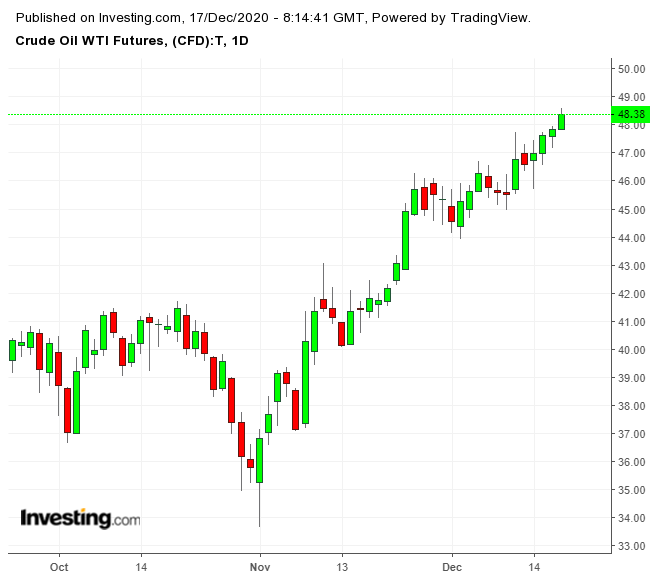Two prominent organizations released their updated oil demand forecasts for what remains of this year and for 2021. Both the Organization of Petroleum Exporting Countries (OPEC) and the International Energy Agency (IEA) slashed their oil demand projections.
Both organizations cited rising coronavirus infections and economic lockdowns in the United States and Europe as reasons for lowering their expectations this week, but the oil market didn’t seem phased about these reports. Instead, oil prices climbed on news that the first coronavirus vaccines were administered in the United States, with Brent hitting $51 per barrel by midday Wednesday and WTI reaching nearly $48 per barrel.

The decrease in the OPEC oil demand forecast comes from the organization’s December 2020 Monthly Oil Market Report. The cartel now anticipates that oil demand in 2021 will grow by only 5.9 million bpd, which is a decline of 350,000 bpd from its previous forecast.
This puts OPEC+ in a difficult position for the fast-approaching ministerial meeting on Jan. 4, 2021. With demand forecasts down—according to OPEC—and prices up, it may be more difficult to settle on policy proposals.
OPEC’s oil market reports are produced by OPEC’s technical and professional arm, and their conclusions are supposed to be independent from the political and diplomatic desires of the ministers who make decisions about oil production. However, it isn’t reasonable to assume that political concerns don’t bleed into the technical aspects, since OPEC’s members provide the funding for the professionals who issue the reports.
It is noteworthy that OPEC’s lower demand projection comes right after OPEC+ agreed to increase oil production by 500,000 bpd in January 2021. In other words, this forecast seems to indicate the ministers may have chosen the wrong policy.
In fact, OPEC’s leadership used the release of this new forecast to signal that OPEC+ may not lift production in February and beyond, despite the decision that will boost January production. OPEC’s current president, Algerian Energy Minister Abdelmajid Attar said, “Despite the positive signs and a significant improvement in oil prices, I think we should be very cautious. In the best-case scenario, we will be able to reach 2 million barrels daily as early as April. But this is not a goal in itself.”
Saudi Arabia, which didn’t want to increase oil production at all in the first quarter of 2021, should be expected to use this report at the Jan. 4 meeting. Saudi Arabia will likely argue against lifting oil production by another 500,000 bpd in February. It is clear from the messaging coming from OPEC’s leadership that supporting a drawdown}} in oil inventory {{ecl-75||surplus will be the major talking point.
However, if we don’t see an end of the year sell-off and oil prices remain stable for the rest of 2020, then Russia and the UAE would have a very strong argument in favor of another 500,000 bpd production increase. They will be able to say that robust demand from China and India are offsetting weakness in Europe and the U.S.
Russia and the UAE would argue that the oil market has demonstrated it doesn’t care about the forecasts or the weaknesses in jet fuel and gasoline demand and oil-producing countries should take advantage of market exuberance, even if it is divorced from demand expectations.
With market prices currently disconnected from expectations, Jan. 4 is shaping up as a contentious debate between those who want to produce more (Russia, the UAE and allies that want to bring in revenue at whatever price is available) and those who want to produce less (Saudi Arabia and those advocating for an attempt to raise prices).
For the OPEC+ oil ministers, is there really any good reason not to allow member countries to increase production since the price of oil doesn’t seem to respond to supply or demand at the moment?
